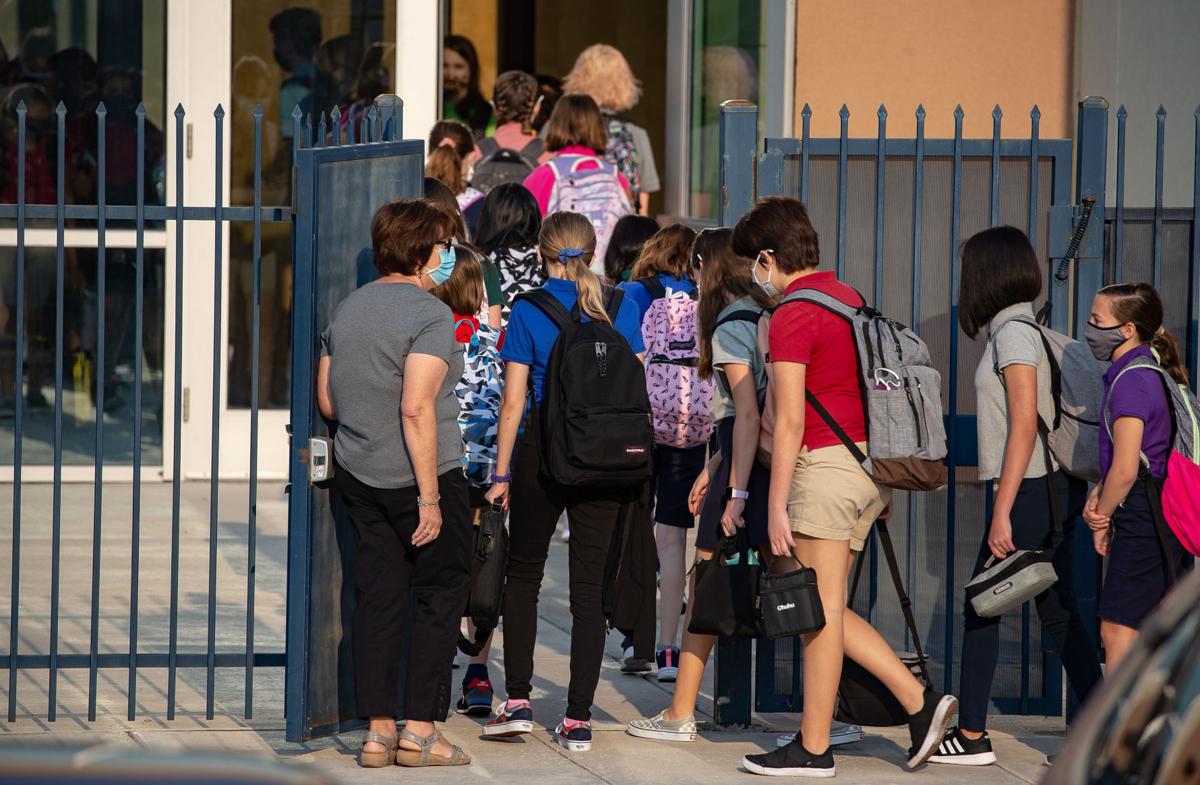Some Tucson charter and private schools have reopened for traditional in-person learning despite Pima County falling short of meeting state benchmarks to safely do so.
The decision to reopen by the schools, which serve thousands of Tucson children, have prompted concerns about public health during the pandemic and complaints of packed classrooms and lax mask-wearing.
“Each school is grappling with the spread of COVID-19 in their community, which is why it’s imperative that schools heed the concerns of teachers, parents and families in making evidence-based decisions,” said Arizona schools chief Kathy Hoffman.
Those evidenced-based decisions may be made in consultation with benchmarks set by the Arizona Department of Health Services, which lay out when virtual learning, hybrid models and in-person instruction are recommended based on data related to hospital visits, a decline in cases and the percentage of positive coronavirus tests.
However, the state’s reopening metrics are merely suggestions, not something schools are required to follow.
As of Thursday, Pima had met two of the three state criteria, failing to have two consecutive weeks with fewer than 7% positive COVID-19 tests.
Though Arizona Gov. Doug Ducey has said the decision to make the health metrics optional is designed to give communities autonomy, some schools may be incentivized to open their doors for a shot at state grants, which allot higher funding amounts for those that physically put children in seats.
Schools that opt to primarily offer virtual learning may also qualify for the grants to assist with funding shortfalls that result from a decline in enrollment and the cost of coronavirus-related measures, but at lower amounts.
Tucson’s nine major school districts continue to primarily offer remote learning, with the exception of those offering on-site care as required by the state to at-risk students. Even then, two schools have been closed and classrooms on one campus were shuttered following confirmed cases in both children and adults.
QUESTIONABLE PRACTICES
Leman Academy of Excellence, with four campuses throughout Tucson serving more than 2,500 children, resumed in-person classes on Aug. 17. Just two days later, a staffer from the east campus, at 10100 E. Golf Links Road, filed a complaint with Pima County.
Though the charter is offering remote learning for families who want that option, the complaint described 26 to 28 students packed into a room that is 27-by-27 feet with additional furniture, built-in shelves, and walkways at the back and the front of the class, leaving about 1 foot of space between desks.
Leman Academy of Excellence Head of Schools Dennis M. O’Reilly would not answer any questions from the Star. Safety measures shared on the school’s website include grade-level cohorts, enhanced cleaning, continuing recess with disinfection of equipment between use, teachers rotating classrooms instead of students, mask requirements for all students and social distancing when possible.
Three teachers at three local Leman schools also told the Star about crowded classrooms with children sitting less than 3 feet apart; they said roughly 60% of the student body is attending in person; there is no social distancing in hallways or on playgrounds; masks are not being worn consistently by children and some staff members; cleaning is inadequate; and teacher safety is not prioritized.
Kelsey Montaño, a parent at Leman Academy in Marana, opted for remote learning for the first quarter. Although Montaño felt Leman’s plan had a lot of good precautionary measures, she says social distancing with that many kids in the classroom is “almost impossible."
“Honestly, I was surprised that they went back as soon as they did,” she said. “I thought they were geared for protection. And then all of a sudden they’re going back in person. That did kind of feel rushed. It was kind of unexpected.”
The Leman Academy governing board voted to return to in-person instruction on Aug. 10, giving teachers one week’s notice they would be returning to the classroom.
O’Reilly sent a letter to families the week of Aug. 17 that included a USA Today opinion article by Dr. Elinore McCance-Katz, assistant health and human services secretary for mental health and substance abuse. McCance-Katz argued that schools should reopen because the mental health impacts on children outweigh the risk of the virus.
“The Trump administration and I simply believe that all children have a right to an education, which means the right to attend public schools and all parents have the right to weigh the very real risk of harm from being out of school against the risk of potential harm from COVID-19,” the article says.
Pima County’s school liaison team addresses all complaints directly with schools, said Aaron Pacheco, Pima County Health Department spokesman. The county tells them about the complaint and provides education specific to COVID-19 prevention at schools.
DATA INTERPRETATION
After the Leman Academy governing board voted to return to in-person instruction, the board governing Legacy Traditional Schools quickly followed suit, voting on Aug. 13 to reopen on Aug. 24.
On Aug. 23, Legacy Superintendent Nicole Kirkley sent a letter to families saying the schools were meeting the state’s guidelines for reopening for in-person learning.
That wasn’t the case, however, in Pima County, where the north Tucson campus is located.
“The current data indicates a moderate spread (yellow), which according to ADHS indicates a hybrid learning model where some students are in physical buildings and some are distance learning,” Kirkley wrote.
The data that Legacy was relying on wasn’t on the Arizona Department of Health Services’ page of benchmarks for schools and child care but buried in the “laboratory testing” data point, which provided more up-to-date, although incomplete, data.
Health officials don’t use data from the most recent three weeks when gauging safety in reopening schools because it is incomplete and changes due to delayed test results and data cleaning, which includes taking out duplicates if someone got tested more than once in a short period of time or transferring cases if a person got tested in Pima but lives in another county, Pima County’s Pacheco said.
“Due to delays in how soon people get tested, how soon those results are reported, and the need to verify and correct that data, it would be misleading to use current statistics ... to make such important decisions,” Pacheco said.
When told that the data was not reliable because it’s incomplete, Legacy spokesman Matthew Benson said, “The data is always quote unquote incomplete.
“To say that Pima County isn’t going to use any numbers from the last two or three weeks because they consider it, quote unquote incomplete and so then everybody just has to be in a state of flux, that’s absurd,” he said.
Besides the decline in cases in Pima County, the Legacy governing board voted to return to in-person instruction because of its comprehensive health and safety plan, Benson said, which includes universal mask wearing, social distancing, reduced class sizes, different traffic patterns in hallways and enhanced sanitation protocols.
The other key factor is “this is what Legacy families have been pleading for,” Benson said. “The demand has been overwhelming from Legacy families.”
He said 30% to 40% of students opted for remote learning while 60% are in person, for an average of 20 students in a class. According to last year’s enrollment, 60% of the school would be 715 students.
Caroline Wagner, a library aide who worked at the Tucson school for nine years, decided to quit at the prospect of going back so soon.
Wagner has a heart issue that puts her at higher risk. She would have been going into five classrooms a day, seeing 100 to 150 kids daily, she says.
“It was a hard decision because I loved my job,” she said. “I loved working with the kids, but I didn’t feel like I should have to risk my life for my job. And I’m one of the lucky ones because I didn’t have to work. I was working because I enjoyed it.”
Three local Legacy teachers told the Star other staff members had resigned, something Benson said he wasn’t aware of. They also shared concerns about inconsistent mask wearing amongst students, and a lack of social distancing in class and at lunch.
Wagner says if the school had waited until after Labor Day to open like most schools across Tucson are doing, she may not have left.
PRIVATE-SCHOOL COMPLAINTS
Two Tucson private schools — Pusch Ridge Christian Academy and Casas Christian School — were the focus of other complaints to Pima County, specifically about mask-wearing, which is mandated countywide for anyone over 5 years old.
Pusch Ridge, which serves about 700 students in grades K-12, opened for in-person instruction on Aug. 17. Families were told in a letter from the school’s headmaster, the Rev. Allen Cooney, that the school would “extend the general requirement of wearing cloth face masks” for the upper grades for two weeks, but that the requirement does not pertain to children in kindergarten through fifth grade.
Cooney told the Star via email that Pusch Ridge was taking a number of safety precautions, including screening for symptoms, physical distancing, hiring health service coordinators, forming a medical advisory board, frequent hand-washing and sanitizing, reduced class sizes, plexiglass barriers, one-way hallways, staggered lunch times, added precautions for vulnerable teachers, and training for students, and the faculty and staff.
The younger grades are in cohorts of 13 to 18 students, “meaning they don’t trade classrooms like middle school/high school classes do,” Cooney said.
Casas Christian did not respond to questions from the Star. But its reentry plan online says masks are required in special classes like Spanish, music and art, and that fourth through eighth grade students need to wear masks when they leave the classroom and are in hallways.
They also have a modified seating plan that includes three children facing each other at one table with 33 inches between them, the continuation of recess and school sports, maximum group sizes of 50 and teachers disinfecting knobs, student desks and chairs at the end of each class.
“Our specific COVID-19 response processes and rationale are ... the result of prayerful collaboration between church, school staff and school board personnel,” the plan says.
Photos: Back-to-school in Tucson during the pandemic
"Mustang Stampede"
Updated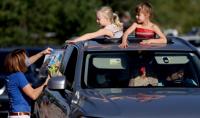
Maddy Jacobs, 7, middle, reaches for her remote learning tool kit from her teacher, Kris Green, as her friend, Carly Kupinski, 6, watches during a "Mustang Stampede" at Manzanita Elementary School for the first day of school on August 17, 2020.
First Day of School, John B. Wright Elementary
Updated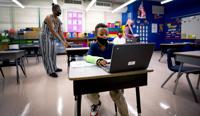
Augusta Iranzi, center, attends his teachers online class while monitors Jasmine Phillip, left, and Nadifo Yusuf, watch students inside a classroom at John B. Wright Elementary School, 4311 E. Linden St., in Tucson, Ariz. on August 17, 2020. About 10 students came to school for online instruction under the guidance of classroom monitors.
"Mustang Stampede"
Updated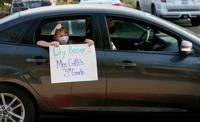
Lily Baser, 8, identifies herself for easy remote learning tool kit pickup during a "Mustang Stampede" at Manzanita Elementary School for the first day of school on August 17, 2020.
"Mustang Stampede"
Updated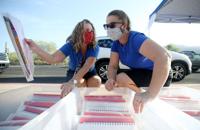
Krista Westmoreland, left, a third grade teacher, shows the remote learning tool kit of a student to Anna Ames, music teacher, during the "Mustang Stampede" at Manzanita Elementary School for the first day of school on August 17, 2020.
"Mustang Stampede"
Updated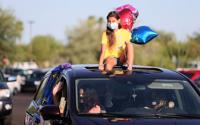
Maya Brown, 9, rides in style for her remote learning tool kit pickup during a "Mustang Stampede" at Manzanita Elementary School for the first day of school on August 17, 2020.
"Mustang Stampede"
Updated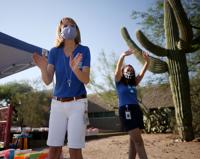
Multiage teachers Kris Green left, and April Pollow greet and cheer on their students during a "Mustang Stampede" at Manzanita Elementary School for the first day of school on August 17, 2020.
"Mustang Stampede"
Updated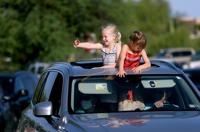
Maddy Jacobs, 7, left, waves to her teacher as she stands in the sunroof with her friend, Carly Kupinski, 6, during a "Mustang Stampede" to pickup their remote learning tool kit at Manzanita Elementary School for the first day of school on August 17, 2020.
"Mustang Stampede"
Updated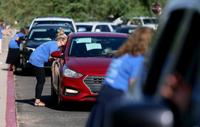
For the first day of school teachers at Manzanita Elementary School greeted their students during a "Mustang Stampede" and handed out remote learning tool kits on August 17, 2020.
"Mustang Stampede"
Updated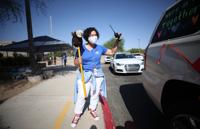
Kim Boling, principal at Manzanita Elementary School, greets her students and parents with a mustang during the "Mustang Stampede" for the first day of school on August 17, 2020.
First Day of School, John B. Wright Elementary
Updated
Yarani Martinez gives a monitor a thumbs up to inform the monitor that his online class is working after classes began at John B. Wright Elementary School, 4311 E. Linden St., in Tucson, Ariz. on August 17, 2020. About 10 students came to school for online instruction under the guidance of classroom monitors.
First Day of School, John B. Wright Elementary
Updated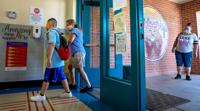
Alice Flores, right, watches as her grandson Jesus Silva is escorted to the cafeteria before classes began at John B. Wright Elementary School, 4311 E. Linden St., in Tucson, Ariz. on August 17, 2020. About 10 students came to school for online instruction under the guidance of classroom monitors.
First Day of School, John B. Wright Elementary
Updated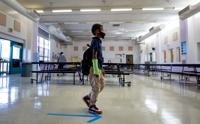
Augusta Iranzi follows the directions on the floor while being escorted to a classroom at John B. Wright Elementary School, 4311 E. Linden St., in Tucson, Ariz. on August 17, 2020. About 10 students came to school for online instruction under the guidance of classroom monitors.



